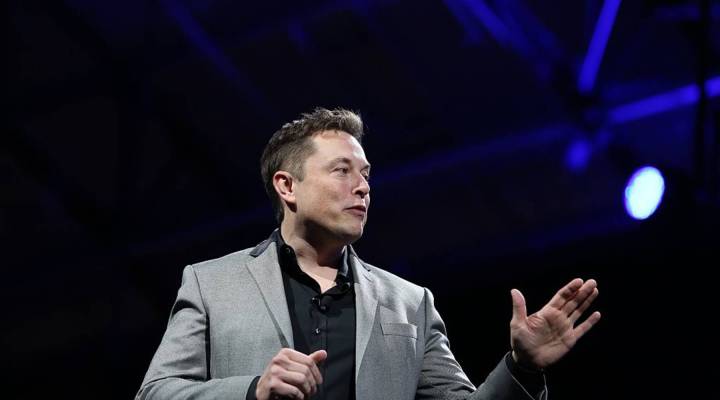
What’s the risk when a company is identified with its CEO?
What’s the risk when a company is identified with its CEO?

Tech founders and CEOs often become household names. Mark Zuckerberg, Jeff Bezos and Steve Jobs are just a few examples. So is Elon Musk, who cut off an analyst for asking boring supply chain questions in a recent earnings call. This week Musk attacked the media overall after news reports about problems with Tesla production, factory injuries and crashes related to its Autopilot technology. Some analysts said investors should be worried about Musk’s behavior and its impact on the company. Marketplace Tech host Molly Wood spoke with Paul Kedrosky of SK Ventures about how the founder’s role has changed since the first dot-com boom. The following is an edited transcript of their conversation.
Paul Kedrosky: Yeah, we’ve kind of gone full circle on this whole issue of founders. So, for a while, as you say, there was kind of this cult of celebrity around CEO founders, and it was almost 20 years ago that that sort of hit its apogee. And then that kind of fell off as it became more about, let’s get adults to run the thing because everyone lost too much money in the late ’90s. And now that’s all really turned around again where once again founders are sort of the celebrity CEOs of the tech set. That has all sorts of consequences. It has some good consequences, like it’s OK to be a nonprofessional CEO who wants to stay in charge of their company and yet raise money. Because that’s always their fear, these young CEOs, that if I raise money, maybe my venture capitalists will tell me I can’t be in charge anymore. And that makes them nervous. So, there’s a good part of it. Then the other side is that there’s a reason why we often like to have not just professional CEOs, but also why you want to put in a bunch of things around the CEO to give you a little bit more oversight and control over what goes on there. There’s lots of data to suggest that as reluctant as some founders might be to embrace it, that it actually leads to better overall performance.
Molly Wood: So is there sort of a bell curve? Is there a point at which it’s great to have the founder really in charge, imbuing the company with the spirit? Tell us about the data.
Kedrosky: Yeah, from a few years ago. So, Noam Wasserman looked at this exact issue. He actually found there was kind of a bell curve, and that around three years out from founding was when having a founder have overall and more or less complete control was a point at which you found companies began to suffer somewhat in terms of the valuation they saw on the market. And that could have been on a public market, it could have been the value they saw when they were raising money. But, the point was in a broad cross section, that seemed to be the point at which if you didn’t begin to relinquish some control as the founder, that had had consequences for you. And that makes a ton of sense, right? Because if you think about it, at that point, if you’re successful, you’ve probably got 50 to 100 employees, well that’s not really your métier, that’s not what you got into this gig for. You got into it because you love technology. You had some things you wanted to do. And similarly, if at two or three years you’re failing, well that’s also another reason why you probably still don’t want the founder in charge, right?
Wood: Well, and then what happens though if we start to over-rotate or over-focus on the outliers? Like you might say in response to that study, “Look at Jeff Bezos, look at Travis Kalanick, look at Elon Musk.” Is it just because we want to kind of make our business leaders into celebrities and say, “This must be the best way,” because of these four people?
Kedrosky: Right, well, this is the problem. It’s kind of as the behavioral finance guys say, it’s the availability heuristic. As I often say to people, when their only example in response to an argument is “Hey, but Steve Jobs,” well, hey, but you don’t really have an argument. The reality is that in a much broader cross section of companies away from a few noteworthy examples — and no one can come up with more than a couple of others — it just doesn’t work that way, and that there are exceptions to that rule just proves that creating companies isn’t physics, it’s creating companies.
| Billionaires will have to duke it out to dominate outer space |
| Silicon Valley could be two years away from having a bunch of female CEOs |
There’s a lot happening in the world. Through it all, Marketplace is here for you.
You rely on Marketplace to break down the world’s events and tell you how it affects you in a fact-based, approachable way. We rely on your financial support to keep making that possible.
Your donation today powers the independent journalism that you rely on. For just $5/month, you can help sustain Marketplace so we can keep reporting on the things that matter to you.


















